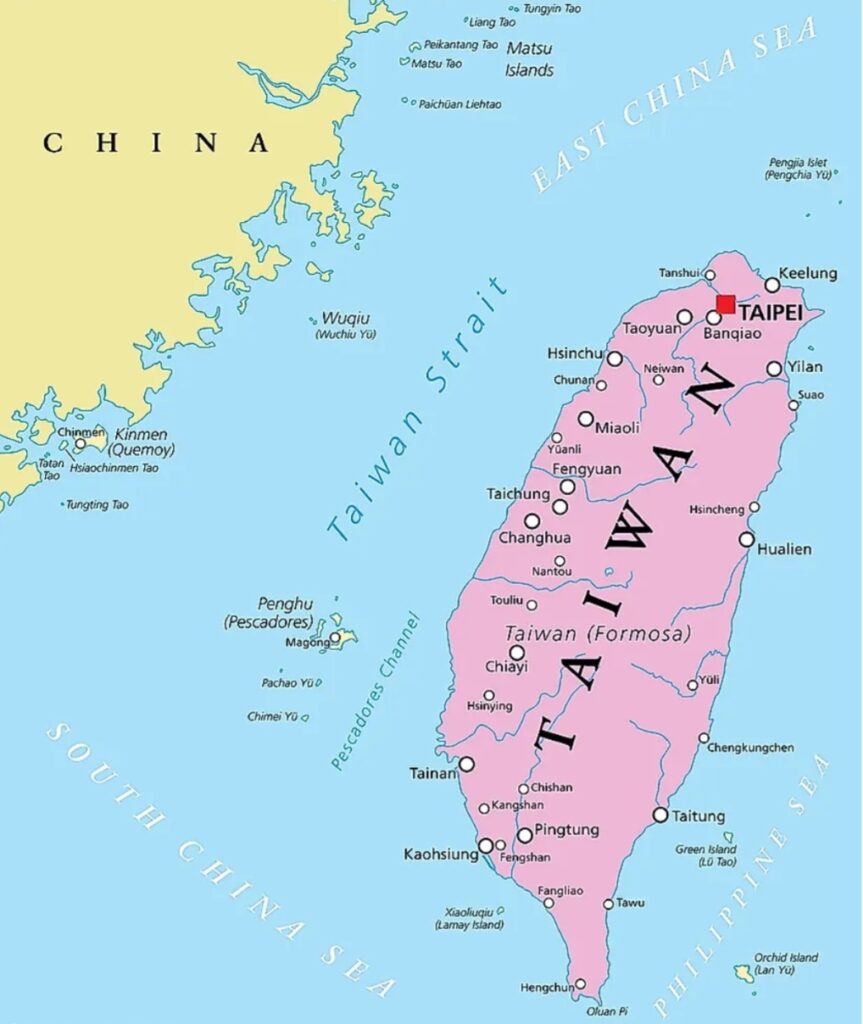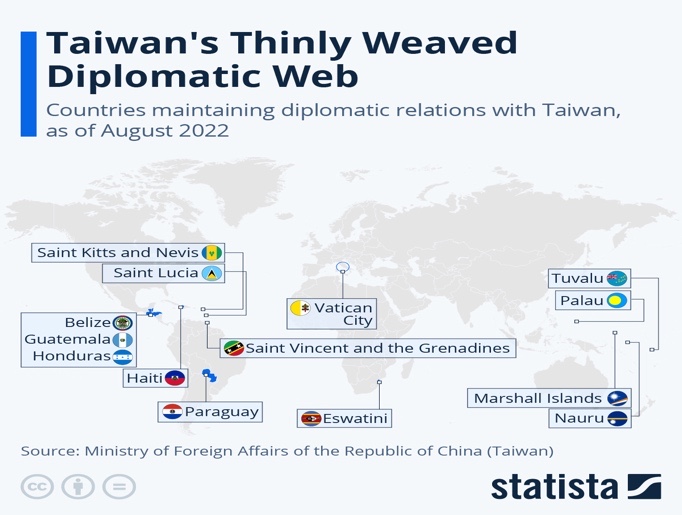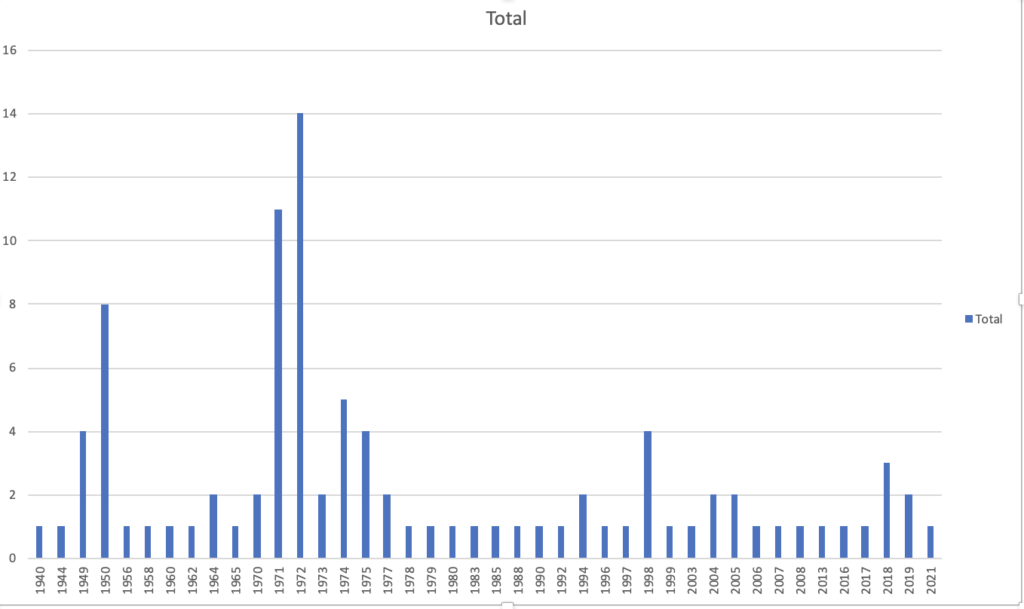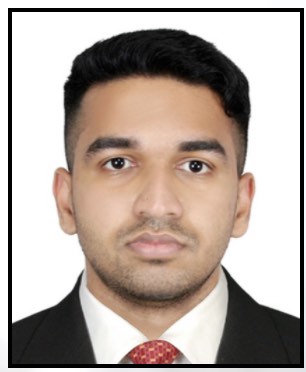By: Rakshith Shetty

Communists entered Beijing in 1949 and their leader, Mao Zedong announced the establishment of People’s Republic of China on October 1, 1949. Mao’s announcement ended the costly full-scale war between the Chinese Communist Party (CCP) and the Nationalist Party, or Kuomintang (KMT). This protracted conflict, which started immediately after the Second World War, was subsequently put to an end with the CCP ruling over Beijing and the Kuomintang retreating to Taiwan on 7 December 1949. Roughly 2 millions of Chiang Kai-shek’s troops, besides many civilians, fled the advancing People Liberation Army of the Chinese Communist Party. The United States of America suspended its diplomatic ties with China and therefore emerged what is today known as ‘One China Policy’, with Mao declaring that no country could have diplomatic ties with both the Republic of China and the People’s Republic of China. Much of the world back then recognized Taipei, while India and the United Kingdom recognized the newly established system in Beijing. The US took decades to recognize a communist dispensation in Beijing, since it was a tussle of recognition between a capitalist state and a communist state for them, which was the basis of the Cold war.
11 nations severed their diplomatic ties with Taipei in 1971, while the figure was 14 for the year 1972. A crucial development occurred in 1971, when the United Nations General Assembly passed resolution 2758 on the “Restoration of the lawful rights of the People’s Republic of China in the United Nations”. The resolution recognised the PRC as the “only lawful representative of China to the UN.” Until then ROC continued to hold China seat in the UN, the resolution expelled “the representatives of Chiang Kai-shek (Taiwan) from the place they unlawfully occupy at the United Nations and in all its organisations.” It transferred all of China’s rights to the PRC, including the permanent seat at the United Nations Security Council.
There was a marked improvement in the bilateral relations between the ROC and the PRC in the 1980s, including the conduct of indirect trade, despite the underlying tensions. During the 1990s, when Taiwan was democratizing and carving out a separate national identity. The PRC adopted a “Three Exhaust Policy”: exhaust the states that recognise Taipei, exhaust Taiwan’s international political space, and exhaust Taiwan’s bargaining chips.
To understand the dynamics of the shifting PRC’s hostility towards the Taiwanese, we need to analyse factions in authority in Taiwan and their ideologies. Ma Ying-Jeou was elected as Taiwanese president in 2008. He was able to carve out a diplomatic truce with the CCP and pushed the cross-strait cooperation to a greater height. Reiterating 1992 Consensus, Ma ensured that he never poked the CCP where it hurt them the most. 1992 consensus holds that mainland China and Taiwan form part of ‘One China’ but allows for differing perceptions of sovereignty; in return, China offered a diplomatic truce by not trying to actively seek to poach Taiwan’s allies. This was evident with Gambia, which broke ties with Taiwan in 2013 and sought to link with China, but China held initially held back.
However, the diplomatic truce ended with the election of Tsai Ing-wen as the Taiwanese president in January, 2016. “A person who disliked attracting attention from others”, Tsai writes about her years in academic, is now a leader who’s standing against China. Carving out a separate (democratic) identity for Taiwan, Tsai has provoked the CCP, which encouraged them to actively engage in poaching Taiwan’s diplomatic allies. China eventually re-established the ties that Gambia has been seeking for 3 years. Today, only 13 countries and one territory recognise Taiwan.
TUSSLE OVER RECOGNITION
To understand China’s viewpoint, we can refer to the White Paper–The One-China Principle and the Taiwan Issue published by the Office of the Charge’ d; Affairs of the People’s Republic of China in the Republic of Lithuania. China views Taiwan not as an adversary, but an “inalienable part of China”, with the current administration being “only a local authority in Chinese territory”, not the rulers of a sovereign country. A size of 36,000 sq. km, a populace of 23 million, and a democratically elected government makes Taiwan meet three out of the four traditional characteristics of a nation state, The fourth being the sovereignty, Beijing will oppose Taiwan’s sovereignty by poaching most of the Taiwan’s diplomatic allies, if not all.

TAIWAN IN THE ERA OF TSAI ING-WEN
Under President Tsai’s New South Bound Policy, Taiwan is seeking to broaden exchanges with the 10 Association of Southeast Asian Nations member states, six South Asian countries, Australia and New Zealand on economic and trade cooperation, talent cultivation, resource sharing and regional links. Its official website states it has full membership in 40 intergovernmental organisations and their subsidiaries, and observer status in 25 others. Emphasizing the benefits, Taiwan actively pushes out its representation to these organisations. It participates in the Olympics under the tag ‘Chinese Taipei’, with a specific Olympic flag, and an anthem. It ensures not to irk the CCP, yet aims to preserve its distinctive identity. Geopolitical affairs expert Elizabeth Larus reveals how these allies in various organisations act as proxies for Taiwan.
BEIJING’S HOSTILITY TOWARDS TAIWAN’S DIPLOMATIC ALLIES
Beijing has sought different tactics to sever Taiwan’s diplomatic ties with others. Primary tool and the most effective has been the ‘chequebook diplomacy’, with its sizeable economic and trade relationship with various countries. Beijing intimidates Taiwan’s allies with trade barriers, non-trade barriers and other means to compel them to align them with Chinese interest. Solomon Islands, for example, withdrew its recognition of Taiwan in 2019 because by then China was its largest trading partner (at USD 375 million annually)
Palau, which still continues to recognise Taiwan, has as much as 40 percent of its GDP share coming from tourism, half of which are visitors coming from China. China ‘weaponised tourism’ against Palau in 2018, which disturbed Palau’s internal politics, some factions advocating a closer relationship with the PRC.
‘Weaponization of aid contributes’ towards a range of less developed countries is another tactic the CCP employs to poach countries to its camp. Grenada’s 2005 decision to recognise Beijing, for example, came attached to Chinese funding for housing, healthcare, scholarships, and the co-hosting of the 2007 Cricket World Cup. Dominica switched diplomatic recognition in 2004 and found itself the beneficiary of USD 112 million in Chinese aid.
South Africa was the last major power recognising Taiwan in the late 1990s. Its flourishing trade with China and fears of a Chinese veto on its future application to join the UNSC council led it to severe ties with Taiwan. ‘Beijing’s international stature’ has been effectively leveraged to manipulate and intimidate others to align with China’s interest.
‘Leveraging the Chinese ethnic diaspora’ to realise Chinese interest in various countries has been one of the most potent tools to limit Taiwan’s diplomatic space. In the Solomon Islands, the Chinese diaspora (Thomas Chan played a prominent role) proved critical to the long-term development of ties, which culminated in formal recognition for the PRC in 2019. Vanuatu’s Prime Minister Serge Vohor resigned because of the crisis created by Chinese lobbyists in the Parliament on Vanuatu’s Taiwan outreach in 2004.
China’s evolving Taiwan policy is to disrupt, isolate and constrain Taiwan. Recently, China has been extremely hostile regarding Taiwan’s presence on international platforms, including apolitical ones. In 2016, China pressurised International Civil Aviation Organisation (ICAO) to not invite Taiwan in Montreal for the conference, despite having 4 major international airports, which represent 23 million Taiwanese. Similar ploy is employed beyond international governance, for e.g. Olympic Committee of Asia blocked Taichung City from hosting the 2019 East Asian Youth Games at the PRC’s instigation.

TAIWAN’S REPSONSE TO PRESSURE
Countering China with similar tactics like chequebook diplomacy, Taiwan, during the 1980s and 1990s, used all its relative economic muscle to aggressively lure and retain Taiwan’s diplomatic allies. During that time, its status as an investor and a donor played an important role in shaping its strategy. For example, Nauru switched diplomatic recognition to Taipei as soon as it realized Beijing was unwilling to fund its bankrupt national airline. In Solomon Islands, Taiwan contributed to “constituency development funds” for individual members of parliament that were suspected of being slush funds. There are reports that indicate Taiwan providing direct cash payments to Nauru’s lawmakers to keep the island to their side.
Taiwan’s chequebook diplomacy backfired when it lost an estimated $30 million in a failed attempt to acquire diplomatic recognition from Papua New Guinea. Beijing’s growing economy is further undermining Taiwan’s aids and contributions. Chinese aid to Pacific island makes up around 10 times of that of Taiwan’s. Since then, Taiwan has been on the back foot and recalculating its strategy.
In 1999, liberalist DPP released a white paper inculcating a new strategy–“flexible internationalism”. First, it involves pivoting away from an exclusive focus on formal diplomatic ties. It argues that “the interaction between nations no longer relies solely on maintaining formal, official relationships.” Taiwan Public Opinion Foundation conducted a poll and found that 60 percent of the population was not concerned about Taiwan’s dwindling diplomatic relationships; only 32 percent were. It reflects that the Taiwanese public support the strategy, while interviews with serving and retired Taiwanese diplomats revealed that, while Taiwan is focusing on cultivating formal diplomatic ties, its foreign policy has moved beyond it.
Taiwan’s focus now is to expand its civil society relationships and build substantive informal ties with big powers, like US and India. Forums like Global Cooperation and Training Framework(GCTF), co-founded with US, have allowed Taiwan to participate in international forums and counter disinformation and cybercrimes, and promote development. Organizations like the Taiwan Foundation for Democracy and International Cooperation and Development Fund play a vital role in forging solid, informal ties. Cooperation with international NGOs is another aspect of the new foreign policy.
As analyst Jaques DeLisle puts it, “The more Taiwan can walk and talk and act like a member of a regime that is open primarily or exclusively to states, the more hope it has of securing the benefits of state (or nearly state-like status) in the international system.” Despite its exclusion from various international bodies, Taiwan attempts to cooperate with international regulations. This strategy is termed “as-if” participation: Taiwan functions as if it were a fully recognised member of the international community. Taiwan has actively sought membership in international organisations, particularly in WHO, ICAO and Interpol.
Democracy diplomacy, neighbourhood diplomacy, Civilian diplomacy, humanitarian diplomacy and environmental diplomacy are all different spheres of activity clubbed under ‘non- traditional diplomatic work’. Democracy diplomacy, traditionally carried out through the Taiwan Foundation for Democracy, seeks to build international cooperation based on democracy and human rights. Neighbourhood diplomacy, reaching out to middle powers in the Association of South East Asian Nations (ASEAN), is an attempt to broaden Taiwan’s sources of diplomatic support. President Tsai’ New Southbound Policy focuses on building traditionally underdeveloped partnerships, India is focused in the policy.
WHY SHOULD THE WORLD CARE ABOUT TAIWAN
China in early 2022, signed a defence pact with Solomon island, which had diplomatic relations with Taiwan till 2019. The security agreement allows the island to be used as a Chinese port of call for the Chinese navy, which was earlier a zone of US and Australian sphere of influence. Taiwan is a crucial part of the first island chain which restricts Chinese aggression closer to home.
Kirbati island severed its diplomatic ties with Taiwan in 2019. The island which was once used by the US as a base during the Second World War is now dominated by Chinese who are redeveloping its military installation on the island. To contain China, Taiwan and its strait plays a vital role. Recent transits of US Navy warships through Taiwan straits have irked the CCP.
Taiwan’s COVID-19 protocol received global praise, even as it was denied the observer status at the 2021 meeting of the World Health Assembly. Controversy also erupted around the role Taiwan could have played, after reports emerged it was among the first territories to realise the likelihood of human-to-human transmission of the COVID-19 virus. Taiwan’s exclusion from international governance, particularly from WHO and ICAO, can prove detrimental to its 23 million citizens from receiving timely and crucial updates regarding health and safety. Finally, as a Taiwanese diplomat argues, the exclusion of Taiwan’s 23 million residents from international governance regimes both undermines the credibility of those regimes and impinges on the legitimate aspirations of the Taiwanese people.

About the Author
Rakshith Shetty is currently pursuing his Masters in Diplomacy, Law and Business at Jindal School of International Affairs, O.P Jindal Global University. The focus areas of his studies include Indo-China studies, Data science, foreign policy, geopolitical risk analysis and corporate threat intelligence. He is a research intern at the Centre for North East Asian Studies of O.P. Jindal Global University. He tweets at @Rakshithreads. The author has informed GSDN that this article has also been published in CNEAS. The views expressed are personal.


Can you be more specific about the content of your article? After reading it, I still have some doubts. Hope you can help me. https://www.binance.com/en/register?ref=53551167
I may need your help. I’ve been doing research on gate io recently, and I’ve tried a lot of different things. Later, I read your article, and I think your way of writing has given me some innovative ideas, thank you very much.
Your article helped me a lot, is there any more related content? Thanks!
Thank you for your sharing. I am worried that I lack creative ideas. It is your article that makes me full of hope. Thank you. But, I have a question, can you help me?
Your article helped me a lot, is there any more related content? Thanks!
Your point of view caught my eye and was very interesting. Thanks. I have a question for you.
Thanks for sharing. I read many of your blog posts, cool, your blog is very good.
Your point of view caught my eye and was very interesting. Thanks. I have a question for you.
Your point of view caught my eye and was very interesting. Thanks. I have a question for you.
Thank you for your sharing. I am worried that I lack creative ideas. It is your article that makes me full of hope. Thank you. But, I have a question, can you help me?
Your article helped me a lot, is there any more related content? Thanks!
Your article helped me a lot, is there any more related content? Thanks!
Thank you for your sharing. I am worried that I lack creative ideas. It is your article that makes me full of hope. Thank you. But, I have a question, can you help me?
Thank you for your sharing. I am worried that I lack creative ideas. It is your article that makes me full of hope. Thank you. But, I have a question, can you help me?
Thank you for your sharing. I am worried that I lack creative ideas. It is your article that makes me full of hope. Thank you. But, I have a question, can you help me? https://www.binance.info/fr-AF/register?ref=JHQQKNKN
Your article helped me a lot, is there any more related content? Thanks!
Your point of view caught my eye and was very interesting. Thanks. I have a question for you.
Your article helped me a lot, is there any more related content? Thanks!
Your point of view caught my eye and was very interesting. Thanks. I have a question for you.
Thanks for sharing. I read many of your blog posts, cool, your blog is very good.
Your point of view caught my eye and was very interesting. Thanks. I have a question for you.
Thanks for sharing. I read many of your blog posts, cool, your blog is very good.
Thanks for sharing. I read many of your blog posts, cool, your blog is very good. https://www.binance.info/register?ref=IHJUI7TF
Thanks for sharing. I read many of your blog posts, cool, your blog is very good. https://www.binance.com/kz/register?ref=K8NFKJBQ
Your article helped me a lot, is there any more related content? Thanks! https://accounts.binance.info/es-MX/register-person?ref=GJY4VW8W